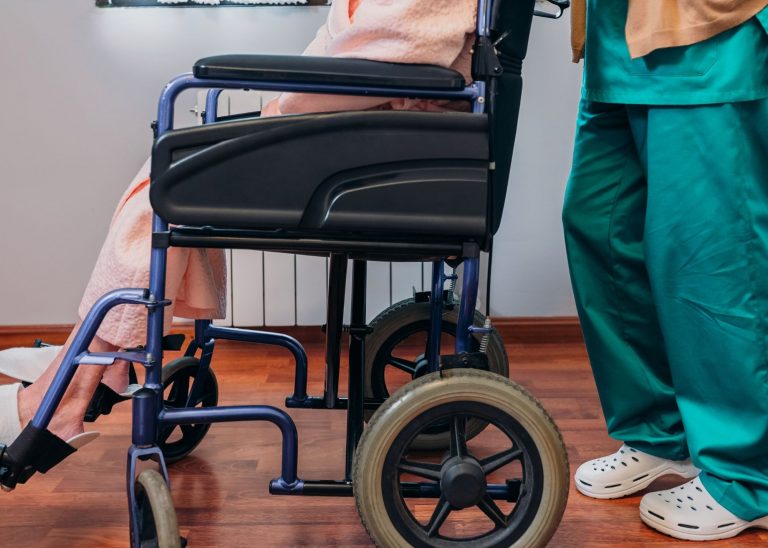When a loved one transitions into hospice care, they do not simply leave the hospital, move home, and hope for the best. Instead, the transition into hospice care begins with a comprehensive hospice evaluation. This evaluation helps your loved one and your family better understand the services offered during hospice care, and helps the hospice care team learn more about your loved one’s needs. This information helps them create a customized care plan to address their specific needs and care goals. After this important meeting concludes, your loved one will be ready to officially enter hospice care and receive the services of their own hospice care team.
What to Expect from Hospice Care
The purpose of hospice care is to provide physical, emotional, and spiritual comfort for someone whose illness is no longer curable. It is typically provided in the patient’s own home so that they can be surrounded by family and all of the usual comforts of home. For caretakers, hospice care provides valuable resources and information to ensure that their loved one is receiving the best support possible. Families are often eligible to receive their own counseling and mental health services from the hospice care provider to help them cope with this difficult phase of life.
Generally speaking, hospice care contains similar elements no matter who is providing it. The hospice care team will schedule visits with your loved one as needed to assist them with activities of daily living (ADLs), such as bathing and dressing, or to complete in-home checkups. The team will likely include a mental health and/or spiritual counselor, who can provide your loved one and other family members with much needed emotional support.
The care team will also arrange for the delivery of any medical equipment and medication necessary and teach family members how to operate that equipment in order to care for your loved one when the hospice team is not visiting. You can call on your hospice care team to ask them questions about your loved one’s care or diagnoses, and they may be able to arrange for transportation to appointments if necessary.
Preparing for a Hospice Evaluation
During a hospice evaluation, a hospice representative will help you determine whether your loved one qualifies for hospice care and will begin collecting information to help the hospice care team provide the best care for your loved one. You can also use the opportunity to evaluate the hospice provider and ask any questions you might have about their services, pricing, and more. This evaluation is free, and there is no obligation to sign up with the hospice care provider at the end.
The hospice care representative will first ask for some vital information, such as your loved one’s full name, address, and contact information for their medical power of attorney. You may also need to provide your loved one’s Medicare information, Social Security number, and the name of their physician. Next, the representative will ask where your loved one is currently living (in a hospital, at home, etc.) and set up an appointment to meet with you and your loved one in person to continue discussing care options.
During this meeting, you can begin making a plan for your loved one’s care. The hospice representative will ask about their diagnosis, symptoms, discomfort, current medications, and health history to better understand their concerns and how the hospice team can help. This information is used to determine if they are eligible for hospice care and, if they are, to begin creating a customized care plan that properly addresses their needs. Many hospice care facilities use Medicare guidelines to determine patient eligibility. Under these guidelines, two physicians must certify that your loved one is terminally ill and likely has six months or less before they pass away in order to qualify them for hospice services.
If you choose to sign up with the hospice care provider you have chosen, you’ll be asked to sign the necessary paperwork to establish care. You can end hospice services at any time by signing more paperwork and choose a new provider if necessary, or discontinue hospice care entirely if your loved one’s condition improves.
READ MORE: 9 IMPORTANT TRUTHS ABOUT HOSPICE CARE
Choosing a Hospice Care Provider
Speak to Superior Senior Home Health for more information about the hospice evaluation process and how hospice care can benefit your family. Our hospice care teams consist of certified nursing assistants, dietitians, licensed practical nurses, registered nurses, therapists, social workers, chaplains, and volunteers, all of whom are trained to provide high quality support for people nearing the end of their lives. Your loved one’s team will create a plan to address their unique needs, and your family will receive comprehensive counseling services and other support as well.
Superior Home Health & Hospice provides compassionate, hospice, home health, and speech therapy in San Luis Obispo and the surrounding areas. Reach out to us to request a complimentary consultation with an advisor to help you determine your loved one’s home health & hospice needs. To schedule your free consultation, call 805.742.4514 or contact us online.

